The thing about “Under the Cloak of War” is that I should like this episode. No, that’s incorrect, I should love this episode.
It’s got everything I want: an exploration of the aftershocks of the Federation-Klingon War; an exploration of what war does to people, how they deal with it — and how they don’t; Klingons, of course; even a space version of M*A*S*H.
And yet… I thoroughly dislike this episode. It drags (despite a noticeably shorter runtime than other episodes this season), the constant flashbacks are disjointed, there’s a reasonably tensionless plot on the Enterprise, and — most frustratingly — they take the worst aspect of M’Benga’s character and make it his whole identity.
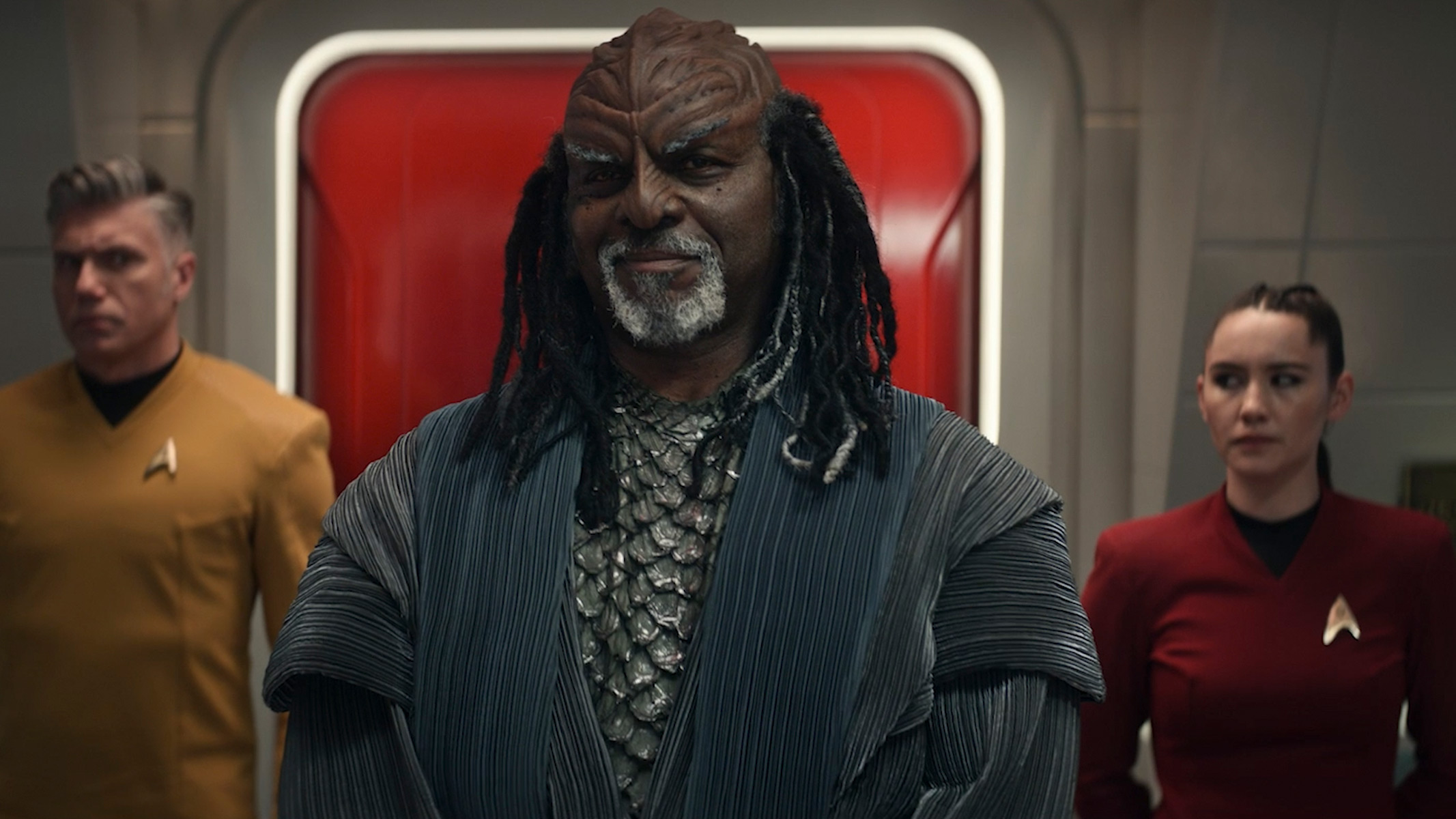
Enterprise is passing through the Prospero system, where she is scheduled to pick up a passenger due for Starbase 12: Ambassador Dak’Rah (Robert Wisdom), a defecting Klingon general who now serves as a representative of the Federation. Dak’Rah is a very interesting character — he’s a soft-spoken, pleasant Klingon atoning for his martial sins, an absolute tack away from traditional portrayals of most Klingons.
Dak’Rah’s persona is refreshing in many ways, but the bristling attitudes of Ortegas (Melissa Navia), M’Benga (Babs Olusanmokun), and Chapel (Jess Bush) are less so. Certainly, for M’Benga and Chapel, their discomfort comes with rounded nuance, but for Ortegas? At this point the character is basically 50% quips and 50% veiled Klingon bigotry, which is barely a foundation for a character at all.
This is okay for the Strange New Worlds writers, however, as they’re willing to use her as a foil when Uhura (Celia Rose Gooding) defends Dak’Rah’s diplomatic record on the bridge — allowing our intrepid helm officer to basically call him a war criminal to his face. She’s lucky the ambassador is more impressed by the size of the viewscreen, even if he then gets let down by Spock’s (Ethan Peck) inability to make a raktajino at the right temperature.
The tour group descends to sickbay, where M’Benga — somehow unaware of the presence of the Klingon ambassador aboard — has to leave before war trauma gets to him. And boy, is that trauma… traumatic! In a series of slightly-disjointed flashbacks, we watch Chapel and M’Benga’s first meeting — during their time at a Starfleet forward operating post on planet J’Gal.
(I might not like this episode; but I love me bit of Starfleet M*A*S*H, especially if we’ve got Clint Howard in the mix as as Space Hawkeye. It’s not a bad concept; hell, I’m irritated it didn’t think of it first!)
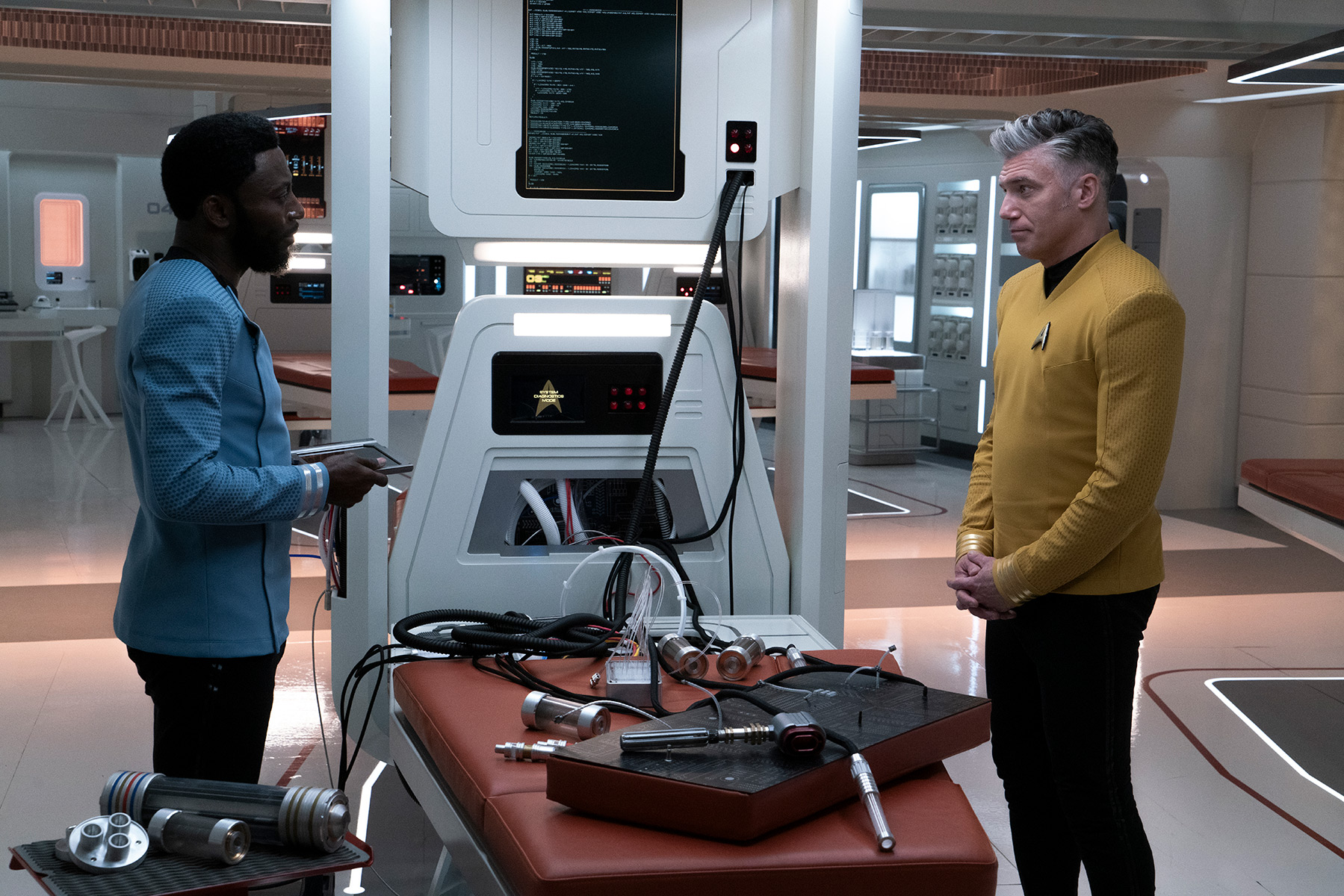
The constant jumping between time periods doesn’t help the flow of the story — soon enough, we’re back in the present where Captain Pike (Anson Mount) informs M’Benga and Chapel that he’s got orders from Starfleet Command that (in an insane bit of logic) veterans of the Klingon War must interact with the ambassador to build a diplomatic bridge to peace.
The pair psych themselves up for the nightmare dinner party of the year, which goes just how you might think: Dak’Rah is endearing and delightful, which eventually drives the trio of veterans to leave (led by Ortegas’ inability to keep her cool). The main problem with her outburst -– as justified as it might seem to be — is that we’ve simply just had so little character exploration from Ortegas that we can’t really tell if this is unrestrained behavior or not. When M’Benga does it, you can feel how much he’s holding back, even as he lets some of his anger slip through; with Ortegas it’s just kind of there.
Back in the past, an Andorian Special Ops officer tries to convince M’Benga to kill General Dak’rah and end the Klingon’s reported war crimes — or, at the very least, hand over the space methamphetamine that M’Benga once formulated. (I have yet to figure out why exactly they decided to make the doctor into some kind of Jason Bourne super-soldier.)
Later, M’Benga confronts the reality of war with a young ensign. It’s some of the typical typical “why we fight” kind of stuff, which Olusanmokun sells well, and is the strongest portion of the flashback story.
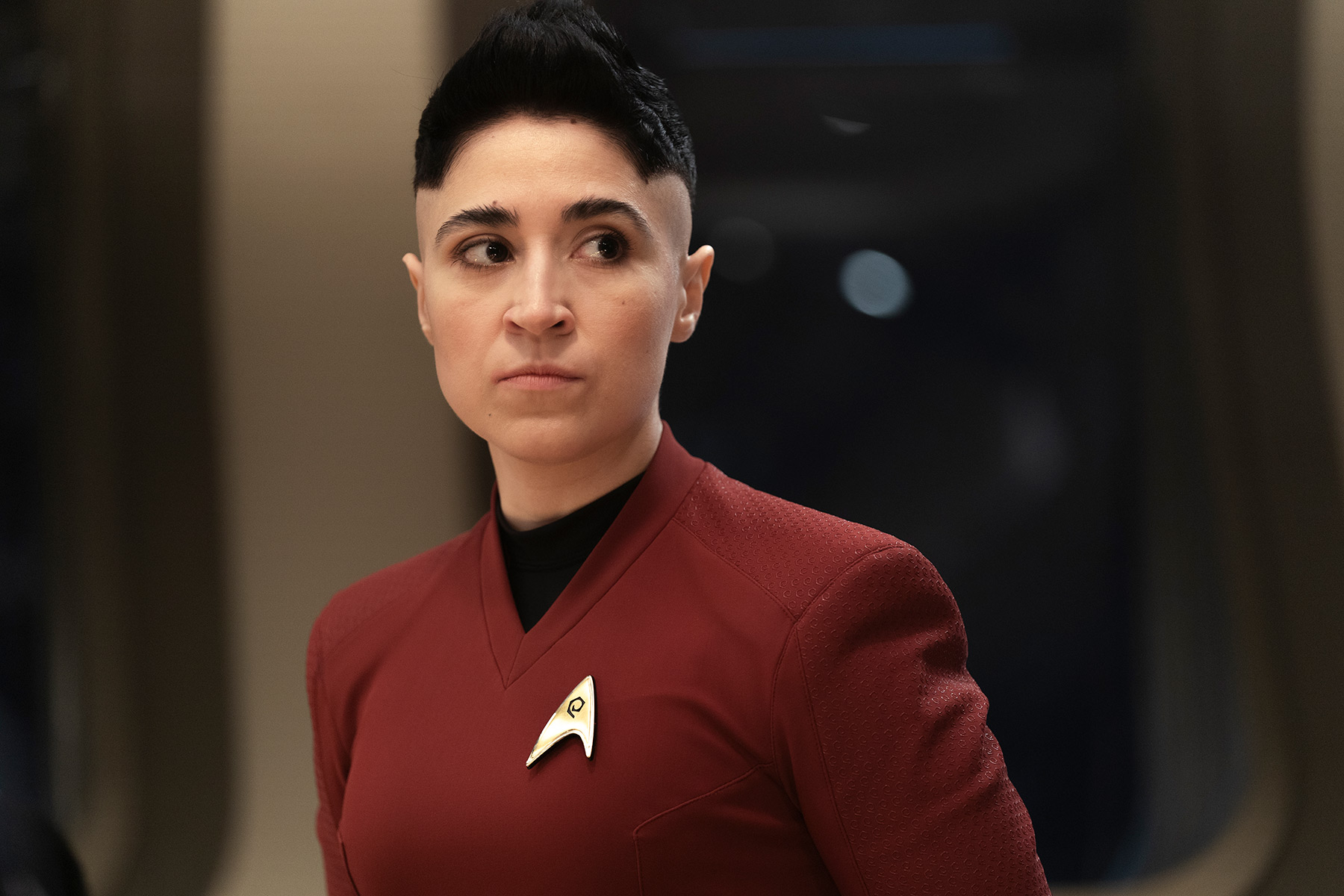
Following the dinner party, Spock tries (in his way) to support Chapel during the stressful time. Her dismissal of Spock’s help should work, and it makes a decent point about combat stress and a veteran’s experience — but it just doesn’t have enough tension to drive it home.
I can see how Chapel’s remarks that “those who haven’t been to war can’t understand the experience” tie thematically into the visuals of battlefield casualties arriving on the transporter pad, but at some point, there are just too many cuts. The drama is still good, however; the disastrous attack on Klingon lines has been met with a vicious counterstrike, and the wounded — both Starfleet and civilian — pour in to the aid camp, as M’Benga is forced to make grim choices to protect lives even as those he’d previously saved are put into body bags.
This is, of course, then cut off by a return to the present, so we can watch M’Benga and Dak’Rah verbally and physically spar in a round of ‘full contact mok’bara.’ The Klingon claims that he wants to work with M’Benga — enemies turned allies would be a powerful diplomatic tool! — but the doctor is deeply disinterested, pressing the ambassador on how he supposedly killed his own men to prevent a further massacre.
This would be nice to dwell on, but instead we go back to the war, where M’Benga decides to go full Terminator and kill everyone in the Klingon encampment with his own two hands — and a couple of Klingon blades.
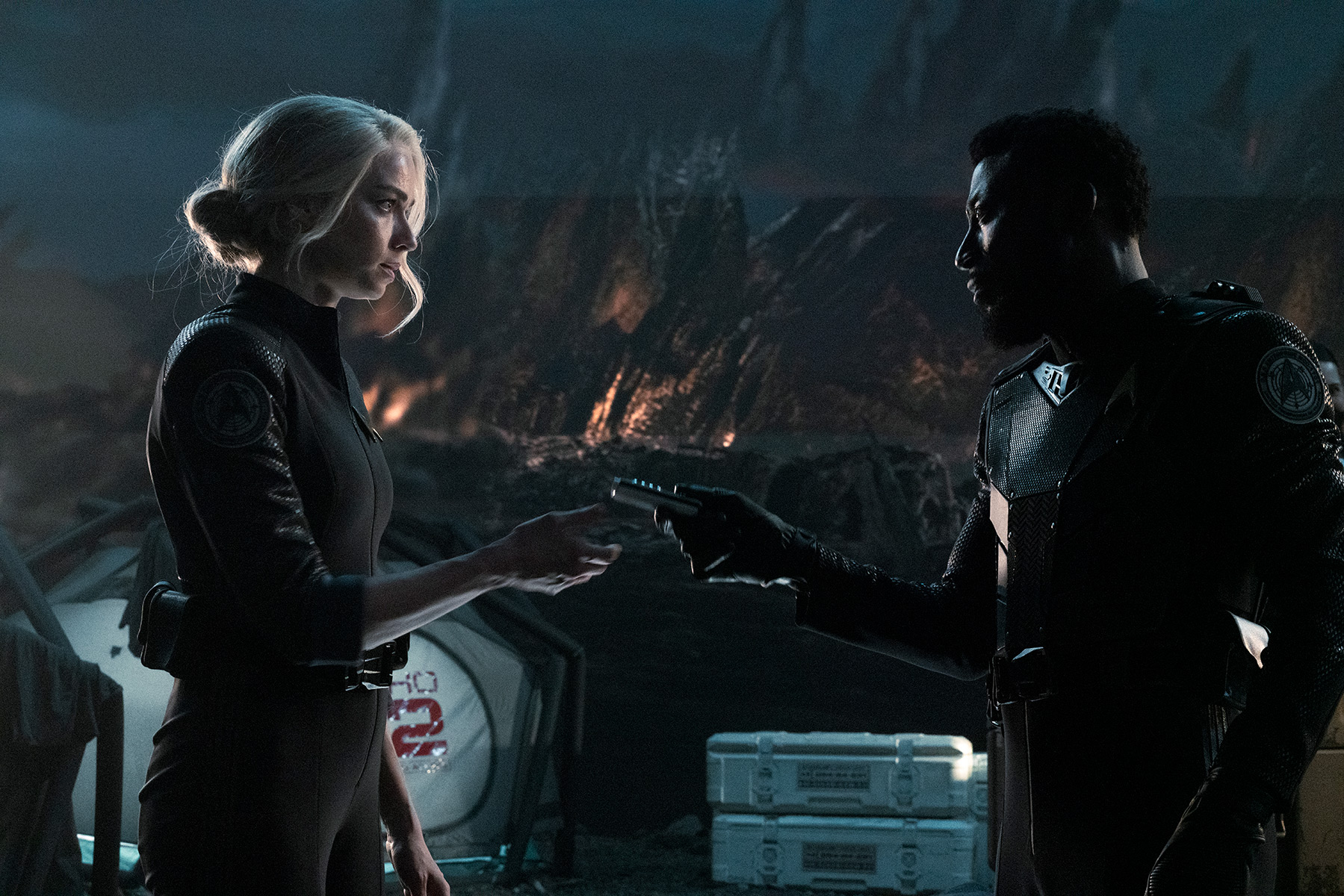
I can’t be the only person who finds this show’s obsession with turning its healer characters into action heroes and drug-fueled killing machines deeply off-putting, right? Watching M’Benga suit up for war and then be told to “take as many with as you can” by Chapel is really macabre. We know the Klingons are bad in this era — evil, perhaps — but the idea that the solution is for our doctor to go full-on killing machine is tonally dissonant with almost everything else Star Trek does.
Back in the present, Pike and Una (Rebecca Romijn) agree to cut short the cruise to Starbase 12 before the deeply-predictable onboard tensions cause even more diplomatic harm. This tension, though, isn’t really there in the story — everyone’s unhappy that Dak’Rah is here, but that’s not plot tension. There’s no active threat to his presence at all, or stakes in getting to the end of this mission beyond “crew morale is not good,” something that, once again, we’re only told about. The dinner party scene has made it clear that (within the senior staff at least) exceptions to Dak’Rah’s presence are the exception, not the rule.
Instead, we get Dak’Rah going to M’Benga with one last offer to join his diplomatic efforts, in which the ambassador undiplomatically refuses M’Benga’s insistent efforts to be left alone… before the doctor exposes the truth: Dak’Rah did give the orders to kill civilians and prisoners, but it was really M’Benga who killed all the Klingon soldiers, and Dak’Rah just took the credit.
M’Benga is furious that Dak’Rah used his trauma and suffering to build his reputation. I really liked this confrontation — the idea of co-opting the horror of war to give people “the saints they need” and the redemption arcs they want to enjoy is an interesting one, and the soft-spoken Klingon ambassador is practically pleading with M’Benga to listening to his argument.
I found it very compelling, at least, until M’Benga stabbed him.
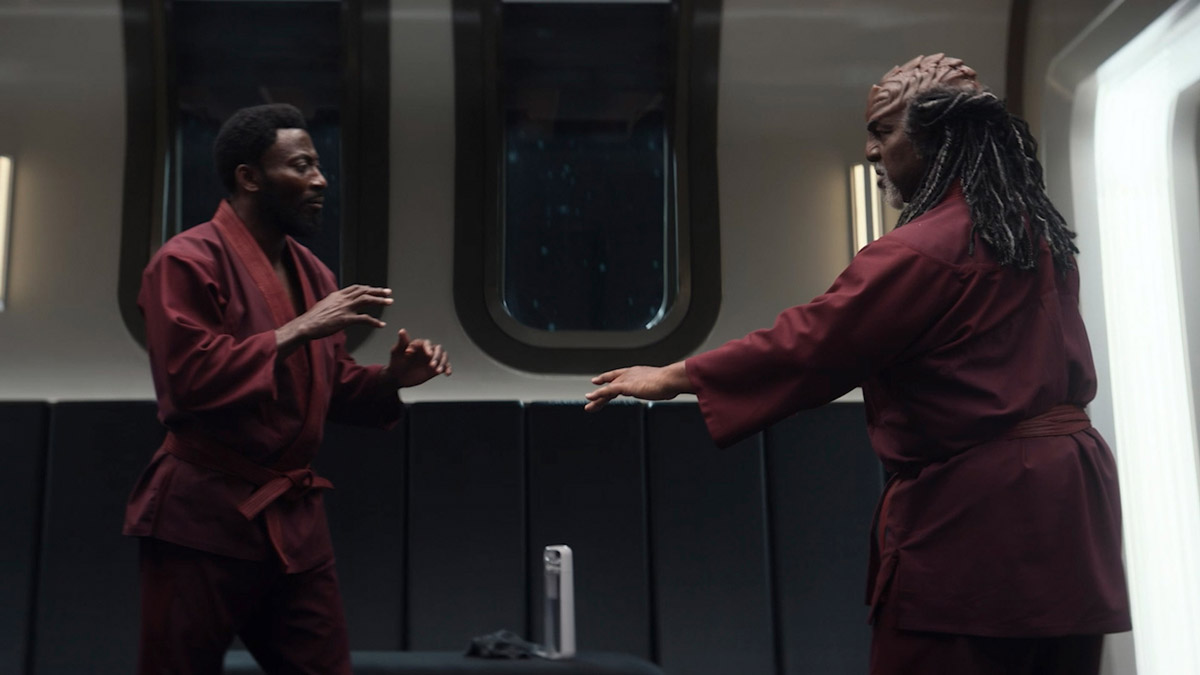
Chapel covering up for M’Benga was a lot less compelling, even if Pike was going to try and paper over the event if the doctor came clean about what happened. Apparently, Pike’s moral code allows him to ignore his own suspicions and let the inquiry conclude that M’Benga killed Dak’Rah in self-defense, even when the doctor strongly hints that it was nothing like that?
I think the conversation between M’Benga and Pike — where the doctor points out that Dak’Rah might not have deserved a second chance — is interesting enough in itself, but it’s a point difficult to hear sincerely from a man who violates his Hippocratic Oath so easily.
What a wonderful message.
OBSERVATION LOUNGE
- Archival footage from Star Trek: Discovery’s premiere two-parter — “The Vulcan Hello” and “Battle of the Binary Stars” — is used in the opening recap; this includes the now-dropped early-Discovery Klingon makeup design noticeably absent from the rest of the episode.
- New starship alert! The USS Kelcie Mae is a new class of Starfleet vessel we’ve never seen before, with a single nacelle and a graceful forward hull that gives serious ‘luxury cruiseliner’ vibes.
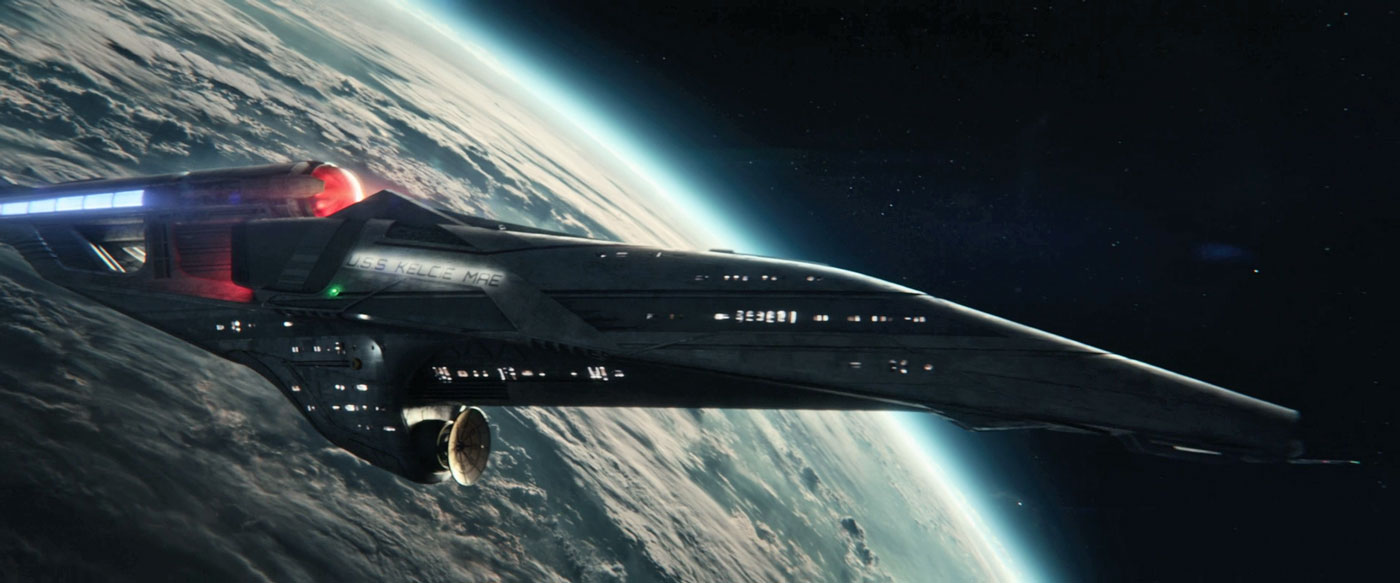
- The boatswain’s whistle used when Ambassador Dak’Rah beams aboard is very similar to the one used in Star Trek VI: The Undiscovered Country.
- The replicated raktajino Spock and Lieutenant Mitchell (Rong Fu) create is served in a mug designed after the angular Feltman Langer mugs often seen Star Trek: Deep Space Nine.
- In the flashbacks, Chapel arrives to J’Gal aboard a new design of shuttlecraft; this ‘heavy-duty’ shuttle is also a new design introduced in this episode.
- The Klingon makeup used on Robert Wisdom has never looked more like a helmet than in this episode; perhaps it’s the actor’s head shape but it just looks so artificial on him.
- It’s never stated in the episode, but could Andorian lieutenant’s black special operations uniform mean that’s connected to Section 31?
- In the flashbacks, M’Benga instructs Chapel on storing Lieutenant Alvarado’s pattern inside the base’s transporter buffer to keep him in stasis until help can arrive — the same trick he uses to keep his daughter’s disease from progressing in Season 1.
- The young ensign heart is from “New Angeles,” a city on Earth’s moon.
- The serum used to give M’Benga temporary “super soldier” strength and endurance is called “Protocol 12.”
- M’Benga and the ambassador spar in “full impact mok’bara,” the martial art often practiced by Worf in The Next Generation and Deep Space Nine.
- Clint Howard returns for his fifth Star Trek appearance (seen this week as Lieutenant Martinez), following his role as an Orion in Discovery’s “Will You Take My Hand?,” a Ferengi in Enterprise’s “Acquisition,” a human in Deep Space Nine‘s “Past Tense,” and of course Balok in “The Corbomite Maneuver.”
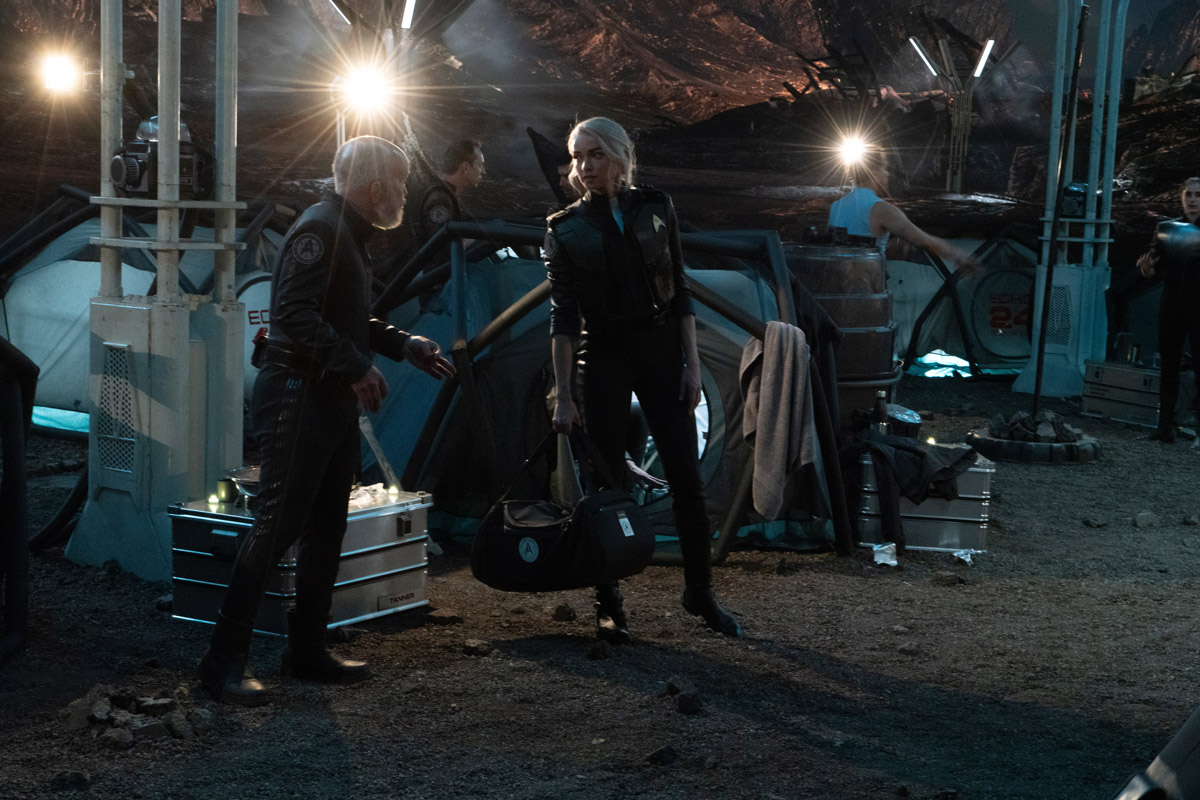
I really, really should have liked this episode. Using the Klingon War to explore how veterans of combat live with their trauma and manage it is a very good concept — and Robert Wisdom and Bab Olusanmokun give it their all — but the plot, pacing, resolution and all just left me disappointed and frustrated.
Certainly, the flashback sequences where Chapel and M’Benga perform surgery in an aid station under fire were well done, especially liked the sequence where Chapel is forced to pump a man’s heart physically — though mainly because Hawkeye also does that. (Whoever in the SNW writers’ room is watching M*A*S*H? Good on you!) But having M’Benga set off to find new and exciting ways to violate the Geneva Convention and then kill Dak’Rah — even in self-defense? Having the murder happen behind a veil is even more annoying.
There was an even chance of setting his episode up to be the next “Conscience of the King” or “Duet,” where our characters get to come face to face with evil — but instead we end up with something that just felt tonally dissonant and flat. The stakes are basically non-existent in the A-plot, and distracting in the B-plot; where tension exists, it’s forced in ways that don’t make that much sense.
On top of that, Dak’Rah’s true intentions and beliefs are never really explored. Was he genuinely reformed? Did truly he want to atone? We don’t know, and never will, because of M’Benga’s actions. The doctor’s anger and horror at what the war did to him is a good idea, but this whole super-commando bit just feels wrong. He should be angry, and he should want Dak’rah dead, but wouldn’t the Star Trek thing be to have him rise above that (even if he needs a little help from his crewmates to do so)?
The entire thing just undermines the hopefulness upon on which Trek is built.
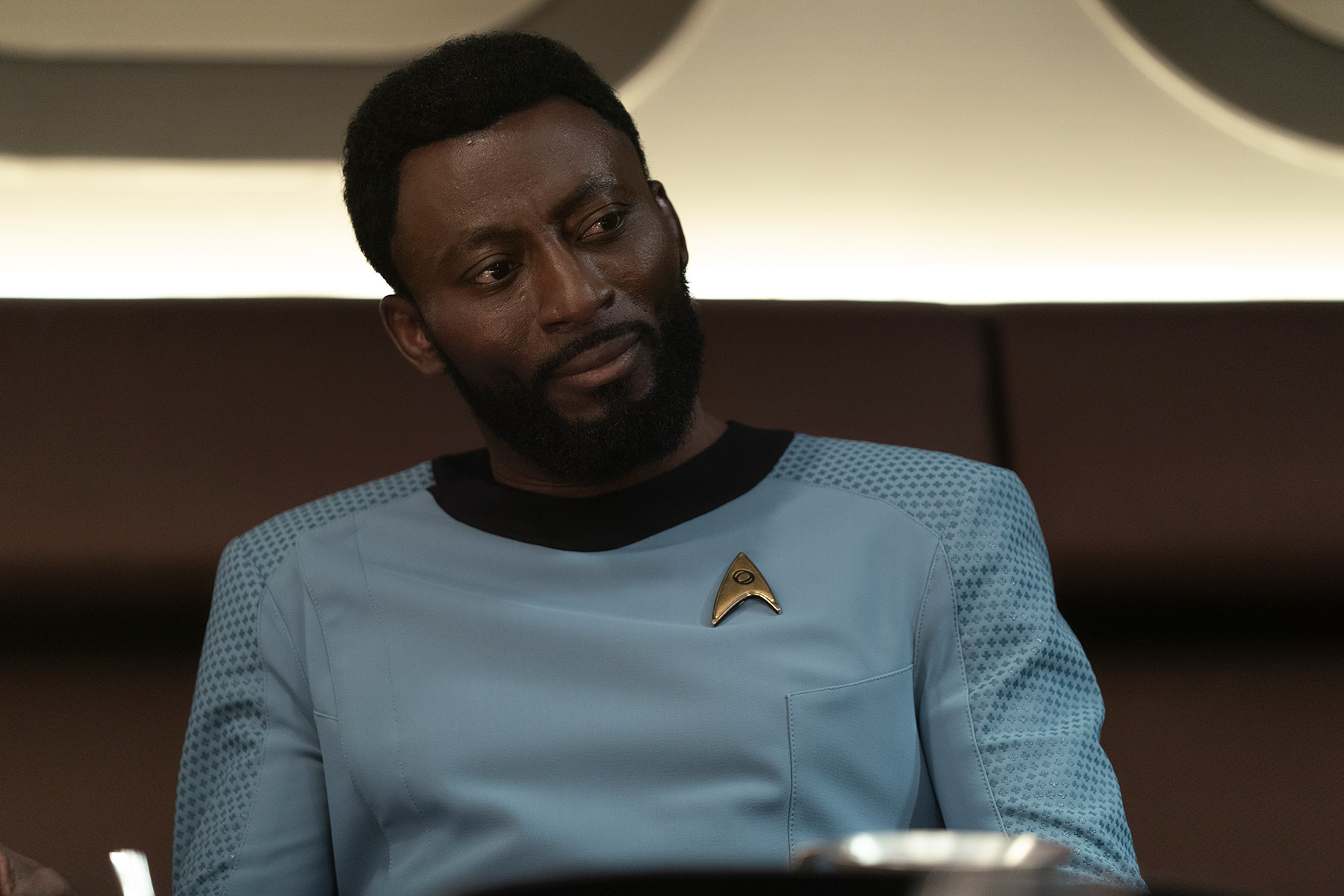
Strange New Worlds was right try a ‘horrors of war’ episode — it made the right choice to try and tackle issues around PTSD and military experience, and what it means to come face to face with a former enemy off the battlefield — but it could have happened that didn’t make our healer into a vigilante… and one that didn’t make 42 minutes feel like an hour.
Next week: it’s time to sing and dance as Strange New Worlds’ musical episode arrives.
![]()
Star Trek: Strange New Worlds returns with “Subspace Rhapsody” on Thursday, August 3 on Paramount+ in the U.S, the U.K., Australia, Latin America, Brazil, France, Italy, Germany, Switzerland and Austria.
